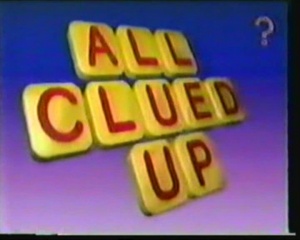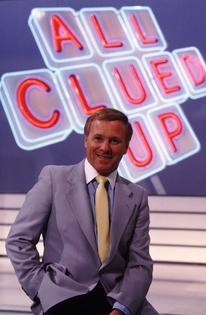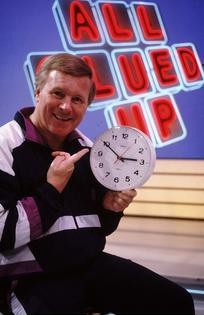All Clued Up
(→Trivia) |
Andywatson (Talk | contribs) (→Catchphrases) |
||
| (5 intermediate revisions not shown) | |||
| Line 37: | Line 37: | ||
When the buzzer sounds for the end of the game the couple with the most cash gets to win even more cash in the Bonus Round. Needless to say, Karl Marx would have a fit. If the buzzer sounds during a game, the puzzle is revealed letter by letter and both contestants in play compete on the buzzer to identify it correctly. Whoever does gets the points accumulated up until then - no points are added while the puzzle's being revealed. | When the buzzer sounds for the end of the game the couple with the most cash gets to win even more cash in the Bonus Round. Needless to say, Karl Marx would have a fit. If the buzzer sounds during a game, the puzzle is revealed letter by letter and both contestants in play compete on the buzzer to identify it correctly. Whoever does gets the points accumulated up until then - no points are added while the puzzle's being revealed. | ||
| - | The couples get a choice of three categories. Once they've decided, they get 50 seconds to solve six words in the style of the toss-up puzzles - i.e. letters would randomly get filled in. As soon as they guess the word they can have a crack at the next one. | + | The couples get a choice of three categories. Once they've decided, they get 50 seconds (60 seconds in the first few series) to solve six words in the style of the toss-up puzzles - i.e. letters would randomly get filled in. As soon as they guess the word they can have a crack at the next one. During earlier series, Hamilton would ask the contestants to step into a soundproof booth for the final round, but in later years, they would simply go through the endgame standing at the keyboard. |
Later series had a flat £1000 prize, but in earlier series couples that won the final round could gamble half their £1000 (that's £500) but can come back the following week to win £3000, and of course whatever they win in the main game. Which is nice. | Later series had a flat £1000 prize, but in earlier series couples that won the final round could gamble half their £1000 (that's £500) but can come back the following week to win £3000, and of course whatever they win in the main game. Which is nice. | ||
| - | The show then? It shouts SUNDAY AFTERNOON TELLLLYYYYY! But somehow it's quite fondly remembered - | + | The show then? It shouts SUNDAY AFTERNOON TELLLLYYYYY! But somehow it's quite fondly remembered - at least it was good-natured and easy to play along with, and Hamilton was a very pleasant and affable host, which helped considerably. The show ended in 1992 mainly because the production company (TVS) lost their licence in an independent TV auction. |
<div class="image">[[Image:All_clued_up_clock.jpg]] | <div class="image">[[Image:All_clued_up_clock.jpg]] | ||
| Line 48: | Line 48: | ||
== Catchphrases == | == Catchphrases == | ||
| + | |||
| + | "...And let's take a look at the keyboard..." | ||
"...Remember, the lit letters are the ones in play for this puzzle..." | "...Remember, the lit letters are the ones in play for this puzzle..." | ||
| Line 65: | Line 67: | ||
"Solve the puzzle." | "Solve the puzzle." | ||
| - | "Will you please join me at the keyboard?" (for the endgame). | + | "Will you please join me at the keyboard?" (for the endgame in later series). |
"Join us after the break, when we'll see which of our couples really is All Clued Up!" | "Join us after the break, when we'll see which of our couples really is All Clued Up!" | ||
| Line 73: | Line 75: | ||
== Inventor == | == Inventor == | ||
| - | Based on the US show ''The $1,000,000 Chance of a Lifetime'', which offered | + | Based on the US show ''The $1,000,000 Chance of a Lifetime'', which offered a million dollars to any couple who won three consecutive bonus rounds. |
== Theme music == | == Theme music == | ||
Ed Welch | Ed Welch | ||
| - | |||
| - | |||
| - | |||
| - | |||
| - | |||
| - | |||
| - | |||
| - | |||
| - | |||
| - | |||
| - | |||
| - | |||
| - | |||
| - | |||
| - | |||
| - | |||
| - | |||
| - | |||
| - | |||
| - | |||
| - | |||
| - | |||
== Web links == | == Web links == | ||
Current revision as of 21:00, 6 July 2019
Contents |
Host
Broadcast
TVS in association with Lorimar-Telepictures and Action Time for ITV, 16 April 1988 to 30 August 1991 (88 episodes in 4 series)
Synopsis
ITV have a sense of humour it seems, they give disk jockey "Diddy" David Hamilton a game show with a giant computer and monitor. So he looked ever diddier. It's a cruel world.
Aaanyway, the show opens with one of the worst theme tunes in game show history. Please, make it stop! Thank you.
The two couples are introduced, and the idea is to accumulate as many points as possible in one of two ways:
(1) Toss-up puzzles. A word frame begins with completely blank spaces and gradually gets filled in. When the players know what the word is they buzz in. If they are right they get £10 and a shot at the big puzzle.
(2) The main phrase puzzle. The main bit of studio gave itself over to a giant computer keyboard and monitor. Or perhaps it's normal size but David Hamilton really is that small, who knows? Before each round the keyboard would flash on and off and when it had finished some of the lights would stay on. All the lit keys represented those letters involved in the big puzzle (a lit "star" key meant there was punctuation in the puzzle). However, one key was lit even though it wasn't in the puzzle - that was the evil villain of the piece, the Stinger! [Accompanied by a horrible growling noise and the audience going "Whooooo"]. Of course, the players didn't know which one the Stinger was and the likelihood of its being picked was variable - sometimes, it was an obscure letter like X or Z and sometimes it was one that was quite likely to be chosen, such as A, E, R or S. The star key almost certainly never featured as the Stinger.
The player would press the keys of two letters. Any of those letters in the main puzzle (a phrase, saying or thing) will appear and for each one £10 is put in the Puzzle Bank. If that player can guess the puzzle correctly they win all the money in the bank. Furthermore, the toss-up puzzles are actually clues to the main puzzle. Cunning, eh? If the player picks the Stinger as one of their letters, Hamilton informs them, "You've been stung" and their go immediately ends without the chance to guess the main puzzle. And that's it - not so much "the Stinger", more "the Pin-prick" p'haps.
The two teams are couples and only one plays in each round. They swap round once a puzzle has been solved. The 'time's up' sound, by the way, is a car-horn-style 'parp, parp'.
Can you guess what happens after the break? Yes! Double the points. Gosh, how imaginative.
When the buzzer sounds for the end of the game the couple with the most cash gets to win even more cash in the Bonus Round. Needless to say, Karl Marx would have a fit. If the buzzer sounds during a game, the puzzle is revealed letter by letter and both contestants in play compete on the buzzer to identify it correctly. Whoever does gets the points accumulated up until then - no points are added while the puzzle's being revealed.
The couples get a choice of three categories. Once they've decided, they get 50 seconds (60 seconds in the first few series) to solve six words in the style of the toss-up puzzles - i.e. letters would randomly get filled in. As soon as they guess the word they can have a crack at the next one. During earlier series, Hamilton would ask the contestants to step into a soundproof booth for the final round, but in later years, they would simply go through the endgame standing at the keyboard.
Later series had a flat £1000 prize, but in earlier series couples that won the final round could gamble half their £1000 (that's £500) but can come back the following week to win £3000, and of course whatever they win in the main game. Which is nice.
The show then? It shouts SUNDAY AFTERNOON TELLLLYYYYY! But somehow it's quite fondly remembered - at least it was good-natured and easy to play along with, and Hamilton was a very pleasant and affable host, which helped considerably. The show ended in 1992 mainly because the production company (TVS) lost their licence in an independent TV auction.
Catchphrases
"...And let's take a look at the keyboard..."
"...Remember, the lit letters are the ones in play for this puzzle..."
"...And the star's been lit, which indicates a hyphen or an apostrophe..."
"And here's the Stinger!" or, "Here's the one that doesn't belong - it's the dreaded Stinger!"
"Nasty fellow, the Stinger, because if you hit him, you miss your turn."
"A (or whatever) is the stinger - you've been stung!"
"Gentlemen, step forward - ladies, take your seats," or, in the event of mixed-gender games, "Players, step forward - non-players, take your seats."
"Come to the keyboard, please."
"Solve the puzzle."
"Will you please join me at the keyboard?" (for the endgame in later series).
"Join us after the break, when we'll see which of our couples really is All Clued Up!"
"Join us next time, when you and the contestants and I get All Clued Up!"
Inventor
Based on the US show The $1,000,000 Chance of a Lifetime, which offered a million dollars to any couple who won three consecutive bonus rounds.
Theme music
Ed Welch




